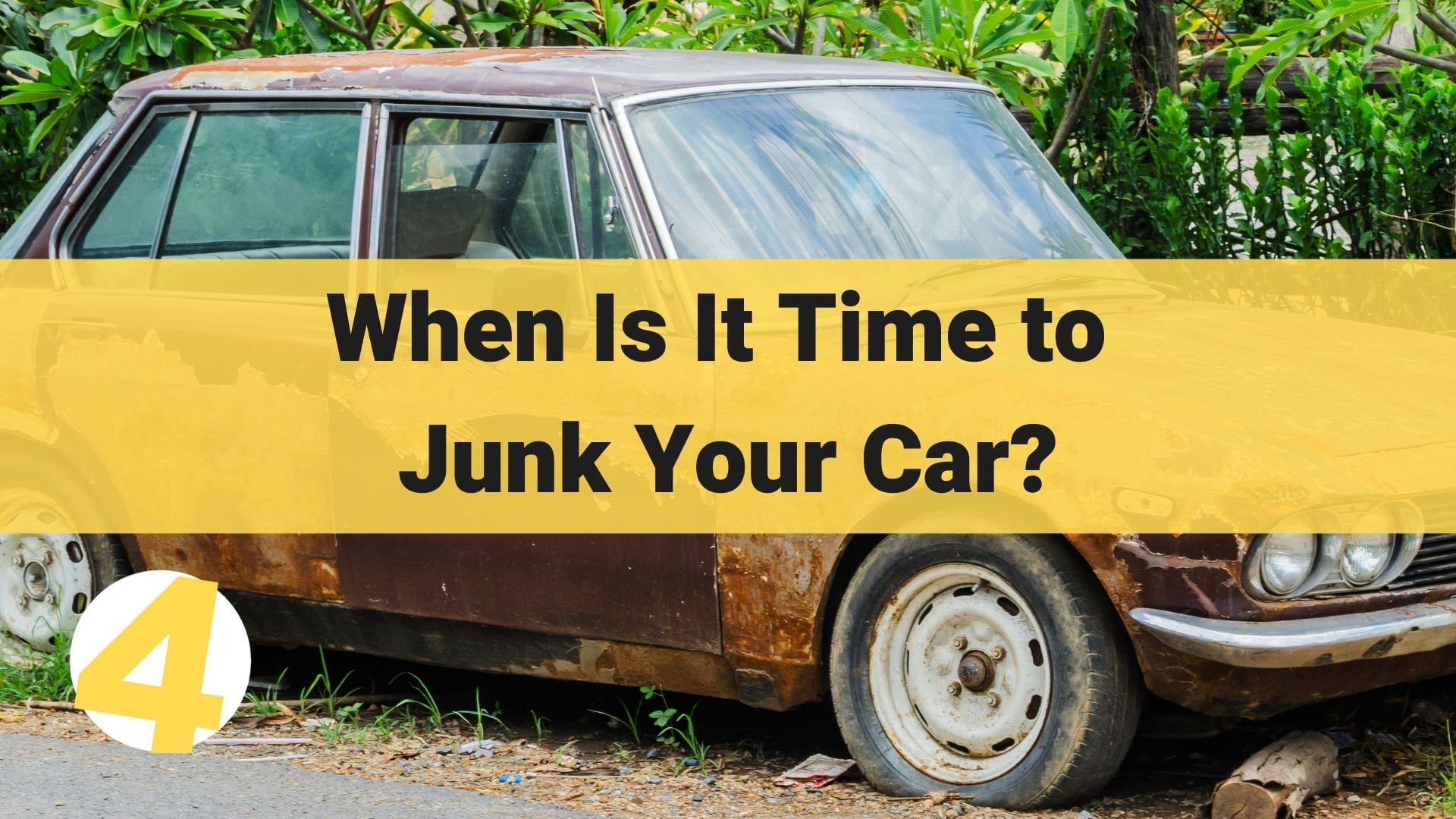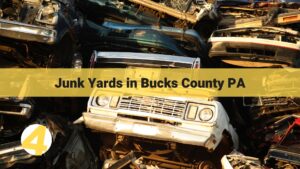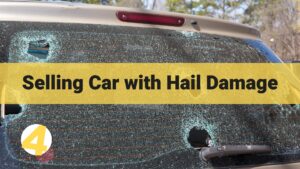Deciding to junk a car depends on factors like extensive repair costs, safety concerns, and diminished value. You will know it’s time to dispose of your car when repairs exceed its value or it fails emissions/safety tests.
We’ve all seen it: that old, trusty auto sitting in the driveway, more of a lawn ornament than a vehicle. But when do you finally say goodbye? Well, saddle up as we drive through the signs of knowing your car’s real score.
When Should You Get Rid of a Car?
When is it time to junk your car? According to the U.S. Department of Transportation, the average age of cars in 2020 was approximately 12.1 years. This suggests that many cars stay on the road well past their adolescent years. But does age matter in cars? Yes and no. While age is a factor, the overall condition, maintenance history, technological advancements, and economic considerations all play a role in determining when it’s time to scrap the vehicle.
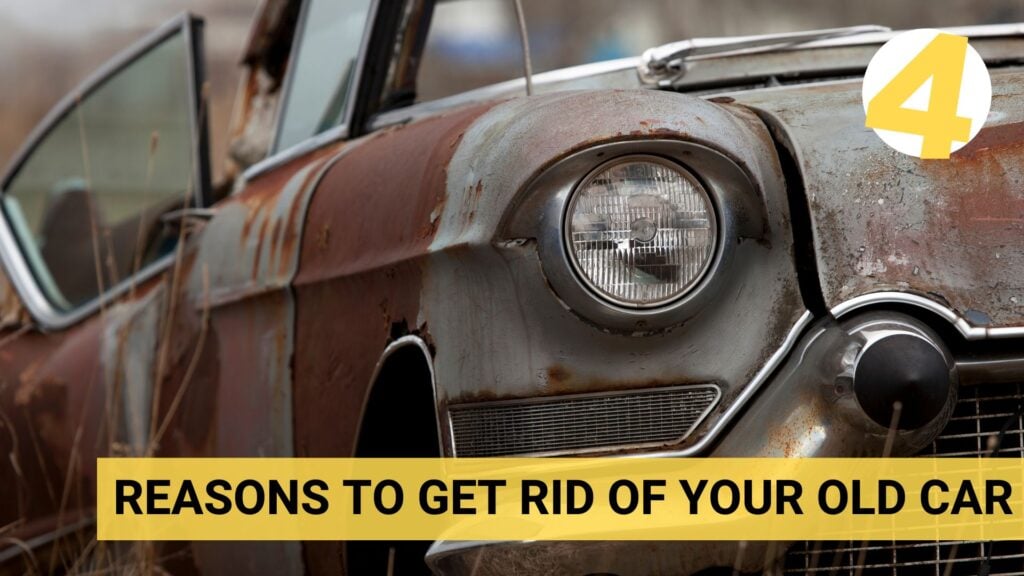
How do you know when to teach yourself that you’ll never ever see your old car (eternally parked in the garage) again? Here are the top indicators you must not wait any longer and do it now:
- Frequent Breakdowns and Repairs
Let’s start with the obvious. Frequent breakdowns and repairs not only drain your bank account but also your patience. The average cost of car repairs in the U.S. can easily run into hundreds or even thousands of dollars per year. When those repair bills start to stack up like a house of cards, it’s time to reassess.
- High Mileage and Declining Fuel Efficiency
Every car has a lifespan, which is often closely tied to mileage. High mileage can lead to a range of issues, from worn-out engine components to decreased fuel efficiency. The average American drives around 13,500 miles per year. If your car is pushing well beyond that, you may want to consider getting rid of it before the vehicle causes more trouble.
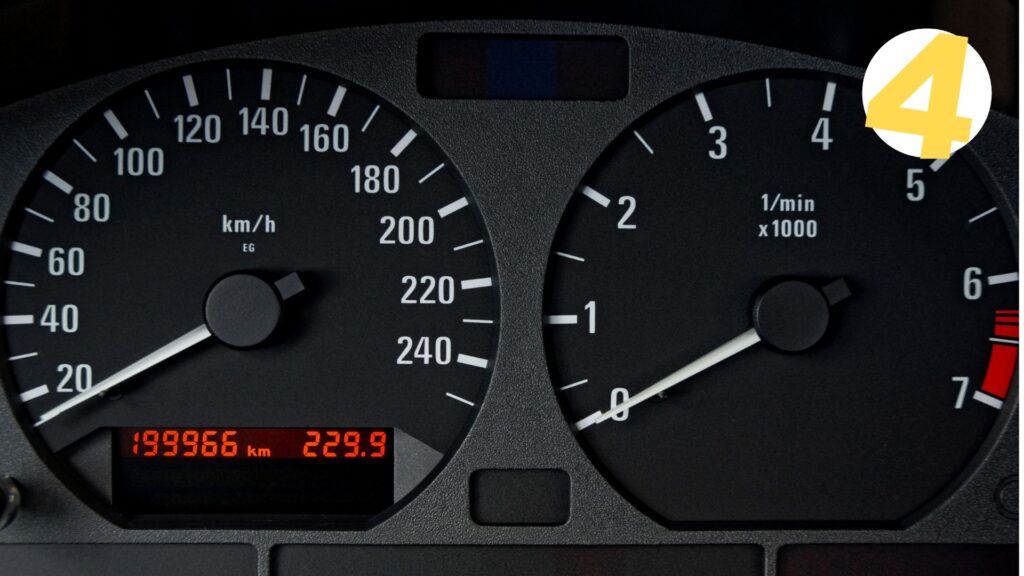
- Unsafe and Costly-to-Repair Structural Damage
If your car has been involved in a serious accident or has accumulated too much rust and corrosion, it could pose a safety hazard on the road. Repairing significant structural damage can also be costly, often exceeding the car’s value.
- Failing Emissions Tests and Increasing Pollution
Failing emissions tests and spewing pollution into the air can land your car in the “time to go” category. Not only is it bad for the planet, but it can also lead to costly fines and headaches.
- Mounting Rust Problems
Rust is the silent killer of automobiles. It starts innocently enough as a minor blemish but can quickly spread, which compromises your car’s structural integrity. Once rust takes hold, it’s a tough battle to win.
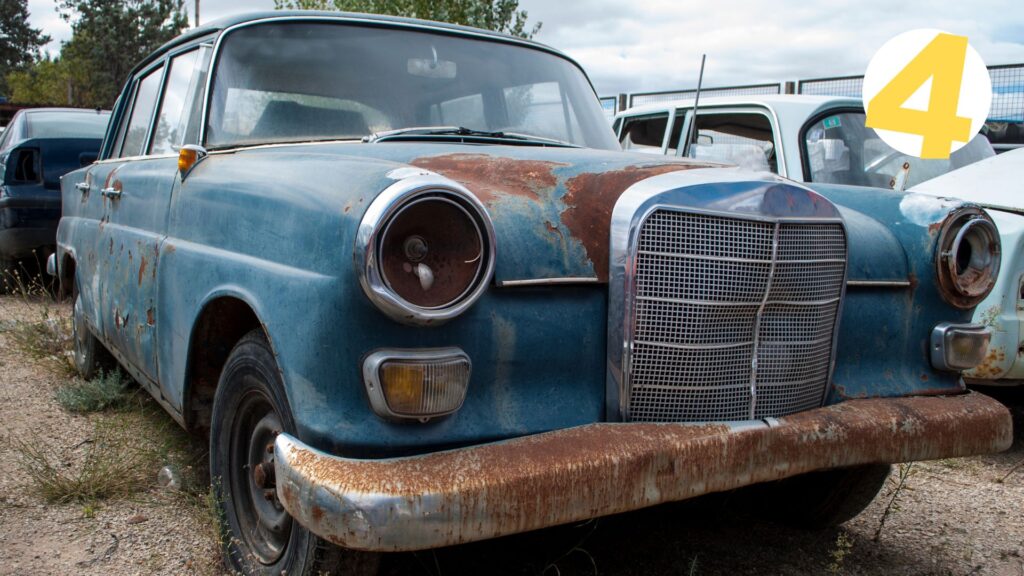
- You Already Have Your Dream Car
Sometimes, you’ve simply outgrown your current ride. While sentimentality is nice, choose practicality when it applies.
- Your Car Is Unused and Looks Neglected
If you find yourself using other modes of transportation more frequently and your car has become more of a lawn ornament than a means of transport, it’s a clear indicator that it’s time to let go. Neglect can accelerate a car’s decline.
- From Vehicle to Yard Ornament
Let’s face it: a car that’s become a permanent fixture in your yard or driveway, complete with weeds growing around it, is a clear sign that it’s no longer serving its purpose. It’s high time to reclaim your outdoor space.
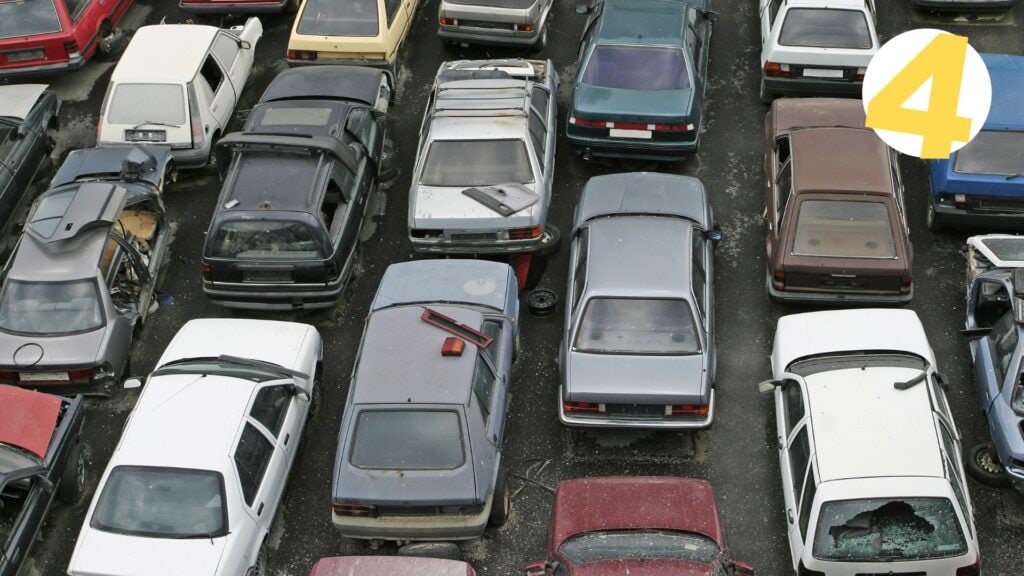
At What Age Are Most Cars Scrapped?
While it’s true that time takes its toll on all things, automobiles included, the age at which most cars end up in the scrapyard can vary widely. One reason for the longevity of modern vehicles is the significant improvement in car manufacturing and materials. Cars today are built to higher quality standards and are often more resilient to the wear and tear of daily driving.
Age might be just a number, but how a car is treated throughout its life matters immensely. Regular maintenance, careful driving habits, and timely repairs can significantly extend a vehicle’s lifespan. It’s not uncommon to see several decades-old cars still cruising the streets when they’ve received the right care.
More importantly, stricter environmental regulations have pushed automakers to produce cleaner and more fuel-efficient cars. As a result, older, less eco-friendly vehicles often get retired in favor of more environmentally responsible options, even if they’re not necessarily at the end of their mechanical life.
While the average age of cars on the road might be around 12 years, this number masks significant variability. Some cars are retired after just a few years due to accidents or severe mechanical issues, while others soldier on for decades. It all comes down to a combination of factors, such as the car’s make, maintenance, and the owner’s priorities.

How To Sell a Junk Car
So, what do you do when you have decided to sell your old car? Here are the factors to consider:
Do I Need To Notify the DMV if I Junk My Car?
Whether or not you need to notify the Department of Motor Vehicles (DMV) largely depends on the vehicle’s ownership status. If you still hold the title to the car, it’s typically your responsibility to notify the DMV when you sell it, even if it’s destined for the scrapyard.
When you sell a car to a junkyard or any other buyer, you’re essentially transferring ownership of the vehicle. This means you must inform the DMV that you are no longer the owner, and the responsibility for the vehicle now rests with the new owner.
Follow these steps to notify the DMV and properly transfer the vehicle’s title:
- Fill out the back of the title with the buyer’s information. You might need to include a bill of sale if there’s no designated spot for a buyer’s name.
- Record the vehicle’s mileage on the title.
- Provide the buyer with a lien release if applicable.
- Submit the completed title transfer paperwork to the DMV.
The rules regarding notifying the DMV can vary from state to state. Some states may require notification even if you’re selling the car as scrap, while others may have different processes for such transactions.
Junking Without a Title
How do you junk a car without a title? This can be tricky because many buyers, including junkyards, often require a clear title to purchase a vehicle. Here are some steps you can take if you find yourself in this situation:
- Check State Regulations. Some states allow the sale of junk cars without a title under certain conditions.
- Obtain a Duplicate Title. If you’ve misplaced the title, you can typically apply for a duplicate title through your state’s DMV. This process can take some time and may involve a fee, so plan accordingly.
- Sell to a Licensed Salvage Yard. Some licensed salvage yards can purchase vehicles without a title, but they often have strict procedures and documentation requirements to ensure they’re not buying a stolen vehicle.
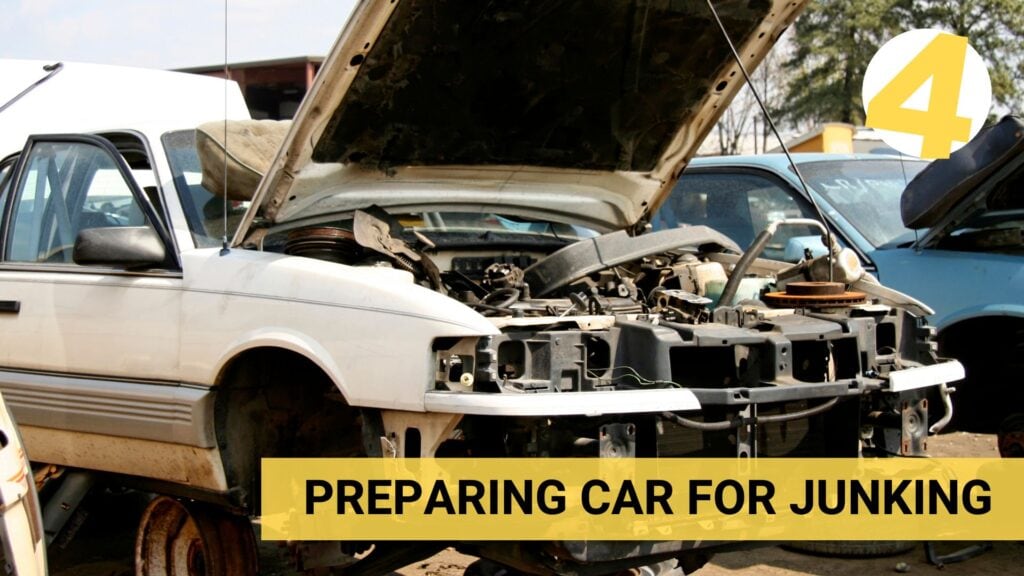
Steps to Prepare Your Car for Junking
Before sending off your old car to the junkyard, you must first accomplish this checklist:
- Remove Personal Belongings. Before sending your car off to the junkyard, make sure to clean out the interior thoroughly. Check under the seats, glove compartment, and trunk to ensure you haven’t left anything behind.
- Cancel Insurance and Registration. Contact your insurance provider to cancel coverage, and notify your local DMV or equivalent agency to cancel the vehicle’s registration.
- Gather Necessary Paperwork. This typically includes the title but may also include maintenance records or receipts for recent repairs.
- Disconnect the Battery and Fluids
Who Buys Junk Cars in Philadelphia?
If you’re in the City of Brotherly Love and have an old, unwanted car taking up valuable space in your lot (and your life), it’s time to look for a hassle-free solution. Enter Cash4Cars! We’re a reputable option if you want cash for junk cars in Philadelphia.
Cash4Cars is a well-established and trusted name when it comes to buying junk cars. We are known for reliability, transparency, excellent customer service, and a solid reputation we have built over the years. We offer a straightforward process and competitive quotes. We’re also committed to eco-friendly recycling. Say goodbye to that clunker and hello to some extra cash. Call us now! 🚗💔💰

